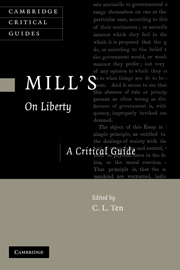Book contents
- Frontmatter
- Contents
- List of contributors
- Mill's On Liberty: Introduction
- 1 Mill's case for liberty
- 2 Mill's liberal principles and freedom of expression
- 3 Racism, blasphemy, and free speech
- 4 State neutrality and controversial values in On Liberty
- 5 Rawls's critique of On Liberty
- 6 Mill on consensual domination
- 7 Autonomy, tradition, and the enforcement of morality
- 8 Mill and multiculturalism
- 9 Mill, liberty, and (genetic) “experiments in living”
- 10 John Stuart Mill, Ronald Dworkin, and paternalism
- Bibliography
- Index
6 - Mill on consensual domination
Published online by Cambridge University Press: 01 July 2009
- Frontmatter
- Contents
- List of contributors
- Mill's On Liberty: Introduction
- 1 Mill's case for liberty
- 2 Mill's liberal principles and freedom of expression
- 3 Racism, blasphemy, and free speech
- 4 State neutrality and controversial values in On Liberty
- 5 Rawls's critique of On Liberty
- 6 Mill on consensual domination
- 7 Autonomy, tradition, and the enforcement of morality
- 8 Mill and multiculturalism
- 9 Mill, liberty, and (genetic) “experiments in living”
- 10 John Stuart Mill, Ronald Dworkin, and paternalism
- Bibliography
- Index
Summary
In his essay On Liberty, John Stuart Mill does not discuss at any length the meaning of political liberty or freedom. “The only freedom which deserves the name,” he is content to assert, “is that of pursuing our own good in our own way, so long as we do not attempt to deprive others of theirs” (CW XVIII, 26 [1, 12]). This is a clear statement of the negative conception of liberty – roughly speaking, the view that one is free simply to the extent that one is not interfered with by others. It is not surprising that Mill subscribed to this conception, given that its strongest proponents included both his mentor Jeremy Bentham, and Bentham's widely read contemporary William Paley. Nevertheless, it is important to keep in mind that the negative conception of liberty was at the time relatively new: it had been introduced first by Thomas Hobbes in the seventeenth century, and it arguably remained the minority view well into the eighteenth century.
Recently, some have argued that the widespread adoption of the negative conception of liberty since Bentham and Paley has come at some cost – in particular, at the cost of obscuring an older, and in many ways more attractive, conception of political liberty or freedom as a sort of independence from arbitrary power or domination. My discussion here will support this view. I will argue that Mill's more or less uncritical acceptance of the negative conception of liberty does him, at times, a disservice.
- Type
- Chapter
- Information
- Mill's On LibertyA Critical Guide, pp. 123 - 137Publisher: Cambridge University PressPrint publication year: 2009
- 3
- Cited by



